Plot
Elsie, a popular nightclub singer, refuses to go out with the customers at the request of the white owner of the club. The owner decides to get Benjamin, the black manager of the club, to talk to Elsie and try to persuade her to cooperate. Benjamin refuses and quits his job. Benjamin tells Elsie of his conversation with the owner and persuades Elsie to stay on because she is popular and can make a lot of money, but he warns her to be careful. Elsie stays, but still refuses to date the customers. Later, the owner hires John and Clyde, Elsie's uncles, to replace Benjamin. One evening, after the club closes, Elsie goes home and finds at her horror that her aunt, who lives with her, is dead. She calls the police and they discover that her aunt has been murdered by a single blow in the head. The police question Elsie and do not believe her story, so they arrest her for the death of her aunt.
John and Clyde testify that they saw Elsie on the night of the murder leaving the club for a short time and later returning. Mrs. Green, the sister of Clyde and John, tells the police that Elsie bought a large life insurance policy on her aunt, with herself as the beneficiary. With this evidence, Elsie is convicted of the crime and sent to prison. Benjamin, who has now become a detective on the police force, and Detective Wanzer, who is a close friend of Elsie's, do not believe that she is guilty and set out to find the real killer. After some investigation, they learn that Mrs. Green's husband was actually in love with Elsie's aunt. With jealousy as a possible motive, Benjamin and Wanzer now suspect that Mrs. Green and her two sons are connected with the crime.
One night they confront John and accuse him of the murder. John refuses to confess, so Benjamin and Wanzer take him to Tolston's Castle, which is supposed to be haunted. There they threaten to tie him up and leave him at the mercy of the ghosts. Terrified, John decides to tell all. He reveals the story of his sister's family, and tells them how her husband was tricked into marrying her. He told them that Mrs. Green's husband was in love with Elsie's aunt when they lived in the South. The husband, after realizing the trick, ran north, but Mrs. Green pursued him, and her two brothers threatened him to get back together with her. Although he stayed at home after that, Mrs. Green's husband continued to see Elsie's aunt and threatened to leave Mrs. Green.
John continues, and admits that he and Clyde lied about seeing Elsie leave the club on the night of the murder. Furthermore, he tells that early in the evening on the night of the murder Mrs. Green found a note left by her husband. The note stated that, out of despair, he had decided to kill Elsie's aunt and then take his own life by jumping off a bridge into the river. John also relates that it was Mrs. Green's plan to frame Elsie for the crime. The police recover Mrs. Green's husband's body from the river, verifying John's story. On this new evidence, Elsie is granted a pardon by the Governor and released from prison. Out of deep gratitude and love, Elsie marries Benjamin, who has been in love with her all the time. [3]

Within Our Gates is a 1920 American silent race drama film produced, written and directed by Oscar Micheaux. The film portrays the contemporary racial situation in the United States during the early twentieth century, the years of Jim Crow, the revival of the Ku Klux Klan, the Great Migration of blacks to cities of the North and Midwest, and the emergence of the "New Negro".

The Moving Finger is a detective novel by British writer Agatha Christie, first published in the USA by Dodd, Mead and Company in July 1942 and in the UK by the Collins Crime Club in June 1943. The US edition retailed at $2.00 and the UK edition at seven shillings and sixpence.

The Fallen Idol is a 1948 British mystery thriller film directed by Carol Reed, and starring Ralph Richardson, Bobby Henrey, Michèle Morgan, and Denis O'Dea. Its plot follows the young son of a diplomat in London, who comes to suspect that his family's butler, whom he idolises, has committed a murder. It is based on the 1936 short story "The Basement Room", by Graham Greene.

My Favorite Brunette is a 1947 American romantic comedy film and film noir parody, directed by Elliott Nugent and starring Bob Hope and Dorothy Lamour. Written by Edmund Beloin and Jack Rose, the film is about a baby photographer on death row in San Quentin State Prison who tells reporters his history. While taking care of his private-eye neighbor's office, he is asked by an irresistible baroness to find a missing baron, which initiates a series of confusing but sinister events in a gloomy mansion and a private sanatorium. Spoofing movie detectives and the film noir style, the film features Lon Chaney Jr. playing Willie, a character based on his Of Mice and Men role Lennie; Peter Lorre as Kismet, a comic take on his many film noir roles; and cameo appearances by film noir regular Alan Ladd and Hope partner Bing Crosby. Sequences were filmed in San Francisco and Pebble Beach, California.

Mrs McGinty's Dead is a work of detective fiction by British writer Agatha Christie, first published in the US by Dodd, Mead and Company in February 1952 and in the UK by the Collins Crime Club on 3 March the same year. The US edition retailed at $2.50 and the UK edition at nine shillings and sixpence (9/6). The Detective Book Club issued an edition, also in 1952, as Blood Will Tell.

The Labours of Hercules is a short story collection written by Agatha Christie and first published in the US by Dodd, Mead and Company in 1947 and in the UK by Collins Crime Club in September of the same year. The US edition retailed at $2.50 and the UK edition at eight shillings and sixpence.
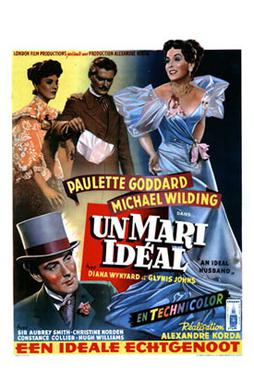
An Ideal Husband, also known as Oscar Wilde's An Ideal Husband, is a 1947 British comedy film adaptation of the 1895 play by Oscar Wilde. It was made by London Film Productions and distributed by British Lion Films (UK) and Twentieth Century-Fox Film Corporation (USA). It was produced and directed by Alexander Korda from a screenplay by Lajos Bíró from Wilde's play. The music score was by Arthur Benjamin, the cinematography by Georges Périnal, the editing by Oswald Hafenrichter and the costume design by Cecil Beaton. This was Korda's last completed film as a director, although he continued producing films into the next decade.

Follow That Woman is a 1945 American comedy crime film directed by Lew Landers and starring William Gargan, Nancy Kelly and Regis Toomey. It was distributed by Paramount Pictures.
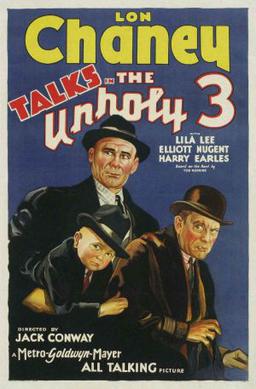
The Unholy Three is a 1930 American Pre-Code melodrama directed by Jack Conway and starring Lon Chaney. Its plot involves a crime spree. The film is a sound remake of the silent 1925 film of the same name, with both films based on the novel The Unholy Three, by Tod Robbins.

Night Must Fall is a 1937 American film adaptation of the 1935 play by Emlyn Williams, adapted by John Van Druten and directed by Richard Thorpe. It stars Robert Montgomery, Rosalind Russell and Dame May Whitty in her Hollywood film debut at age 72, who earned an Academy Award nomination for Best Supporting Actress. She reprised her role in the stage drama in London and New York City. A critical success, Night Must Fall was named the best film of the year by the National Board of Review. Robert Montgomery also received an Oscar nomination for Best Actor in a Leading Role. A 1964 remake starred Albert Finney, although the remake did not do as well as the original.
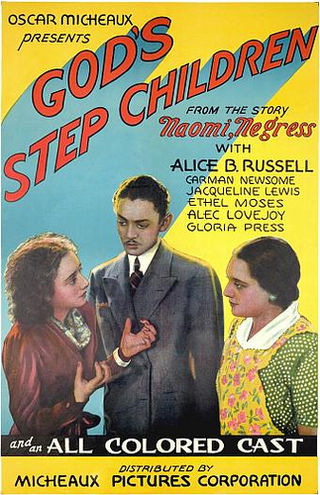
God's Step Children is a 1938 American drama film directed by Oscar Micheaux and starring Jacqueline Lewis. The film is inspired by a combination of elements shared from two previously released Hollywood productions, Imitation of Life and These Three.

Surfeit of Lampreys is a detective novel by Ngaio Marsh; it is the tenth novel to feature Roderick Alleyn, and was first published in 1941. The novel was published as Death of a Peer in the United States.
"Mother's Day" is the 287th episode of the American legal drama television series Law & Order, and the tenth episode of the show's thirteenth season. The 45-minute episode was filmed in New York City, was written by Janis Diamond, was directed by Jace Alexander, and originally aired on NBC on January 8, 2003.

Crow Hollow is a 1952 British second feature ('B') mystery film directed by Michael McCarthy and starring Donald Houston, Natasha Parry and Patricia Owens. It was written by Vivian Milroy based on the 1950 novel Crow Hollow by Dorothy Eden. Newlywed Ann Amour survives a number of murder attempts, while her maid is found stabbed to death by unknown assailants.
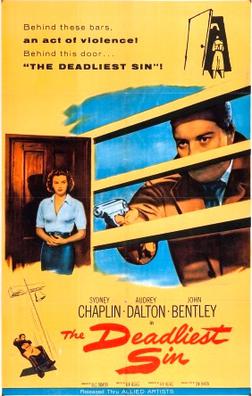
Confession, released in the United States as The Deadliest Sin, is a 1955 British drama film directed by Ken Hughes and starring Sydney Chaplin, Audrey Dalton and John Bentley.

Ladies of the Jury is a 1932 American pre-Code comedy film directed by Lowell Sherman and written by Marion Dix, Edward Salisbury Field and Eddie Welch based on the 1929 play of the same name by John Frederick Ballard. The film stars Edna May Oliver, Jill Esmond, Ken Murray, Roscoe Ates and Kitty Kelly. It was released on February 5, 1932 by RKO Pictures.
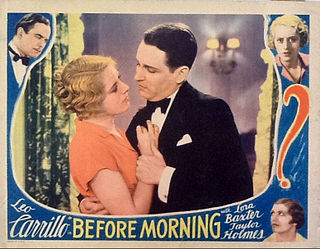
Before Morning is a 1933 American pre-Code crime drama directed by Arthur Hoerl, and starring Leo Carrillo, Lora Baxter, and Taylor Holmes. The film was adapted for the screen by Arthur Hoerl, from the 1933 Broadway play of the same name by Edward and Edna Riley.
The Madonna's Secret is a 1946 American film noir crime film directed by Wilhelm Thiele and starring Francis Lederer, Gail Patrick, Ann Rutherford and Edward Ashley.
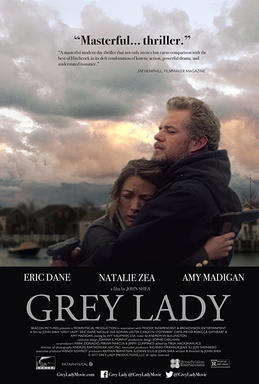
Grey Lady is a 2015 American film directed by John Shea. The film centers on a Boston homicide detective, Doyle who searches for clues about a serial killer that murdered both his sister and his partner. His search leads him to Nantucket where he uncovers secrets about his family's past. The film was shown at the Nantucket Film Festival in 2015, and was not widely seen until released direct-to-video and video on demand in 2017.

















